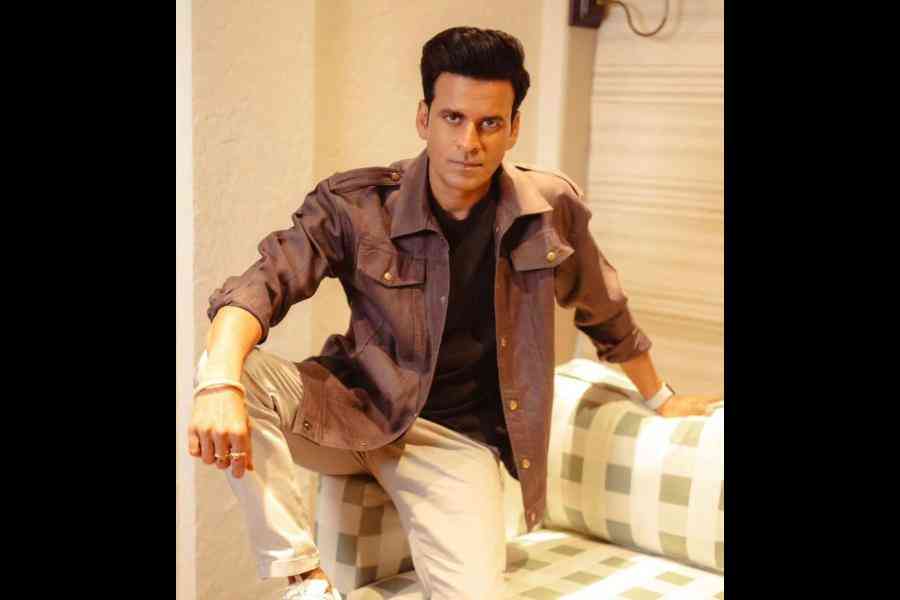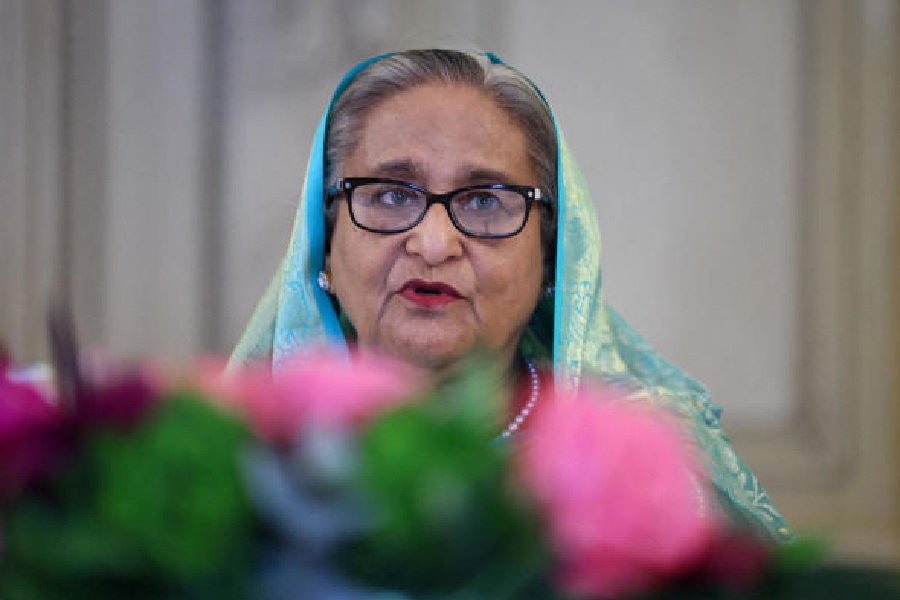Every conversation with Manoj Bajpayee throws up a new facet of the man and shows how his creative mind — not limited to just being an actor — works. Last week, the actor was at the International Film Festival of India (IFFI) in Goa for a special screening of his December release Despatch, that will stream on Zee5. The morning after, t2 caught up with the actor who clocked 100 films this year, for a chat.
You travel to film festivals all over the world. What do you like the most about the energy of a film fest?
That the main goal is to celebrate films. I like meeting great minds and exchanging ideas with them... it is very enriching. I would really like to visit all the film festivals in the world and that is because of their energy. They are so vibrant and what attracts me is that most of them focus only on cinema as an art, not cinema for business. That (marketing and selling films) is a different stage altogether, which is far more traumatic (smiles). The challenges which come while selling a film, once the festival is over, are arduous. That is one part that every filmmaker should be ready to fasten their seat belt for.
Do you think that the film festivals in India are on par with the big ones in the world?
Definitely. I have been to so many here. We are talking about a country which has so many languages and so many (film) industries. The history of our films is so deep. Just yesterday, I was reading how Satyajit Ray was completely mesmerised by Bimal Roy’s films. A filmmaker of the stature of Ray also had someone to look up to... that is how rich the cinema history of our country is.
The question is: are we now making films on par with the biggest in the world? I don’t know. We are making our own films and some of those films are making a mark globally.
Has Indian independent cinema got a shot in the arm with these festivals?
The emergence of filmmakers like Dibakar (Banerjee) and Anurag (Kashyap) has inspired a new generation of filmmakers. Our women directors are doing so well in some of the biggest festivals in the world. This is a great sign for cinema as an art.
There is always mainstream cinema which is very strong all over the world. They find their distribution (channels) very easily. But independent cinema — from conceiving the idea to releasing it — is very tough. You finish a film and then you don’t know where to go with it. Independent cinema has always struggled in this country. But kudos to the filmmakers of every generation who have been sticking to their dream and making it. They have been making it relentlessly without getting discouraged by the reality of what awaits them once the film is done.
A case in point being the globally feted All We Imagine As Light managing to release in a handful of theatres in India, while on the same Friday, a ’90s re-release led by two superstars opened in four times the number of screens....
I look at it differently. I see a positive change here. That All We Imagine As Light has secured a release is a very positive move. It is good that the film found a mentor in Rana Daggubati who took it upon himself to give it a decent theatrical run. Depending on the response to it, I am sure they will look at increasing the number of shows.
Honestly, there is nobody one can blame. At the end of the day, it is the audience that has to be the ‘mentor’ of these films. If these kinds of films manage to even get 100 mentors from among the audience, that would be a big achievement. I look at it as a movement which will not happen overnight, it will happen slowly. For years, independent films have been creating their own audience. For me, All We Imagine As Light getting a pan-India release and being backed by Rana, whose family has a history of producing and distributing films, is a huge step in the right direction.
As opposed to a lot of films that don’t even see the light of day in theatres...
Absolutely! My job is not only to act in an independent film. I also have to leverage all my resources to take it to the theatres and manage a decent number of shows. As I said, it is a humongous task. Without any resources, one has to do it purely out of passion. There is no money. But we do it because we love cinema.
You have said in the past that your real joy lies in the process of making a film and that you detach yourself from a film once it is done, irrespective of its fate at the box office. Isn’t what you just said dichotomous to this statement?
I don’t really bother about the box-office performance of a film, but I do have a responsibility to ensure it gets eyeballs and the right platform. I put in all my resources, connections and three decades worth of experience and then work with the knowledge that most people will say ‘no’ when approached to buy an independent film. But somehow, you have to create a way.
Your December release Despatch, for which you are at IFFI, gave you the chance to play a journalist. What was the biggest takeaway from working in this film?
The chance to collaborate with a mind like (director) Kanu Behl, who is very different from most filmmakers I have interacted with. He is interested in finding layers within the characters that he writes in his films and taking them on a journey through the dark alleys that all of us have within us. It is a tortuous journey and his workshops are very difficult and disturbing at times. But the way he takes you through those alleys, holding your hand, telling you so much more about you as a human being, also enriches you as an actor.
The media is much maligned. After playing a media person in Despatch, do you think a section of the media is also misunderstood?
All of us are misunderstood. But there are few areas within ourselves which we have to look into and correct... we as an industry, I as an actor, you as a journalist and the media community as a whole. We all have to be cautious about what we do and how we treat our job. I can lie to myself day and night that I am a very good actor... but deep within, it is only I who will know what kind of work I have done in a particular film... where I have given my 100 per cent, where I goofed up. I am my biggest critic... I find it very difficult to watch anything that I have done. When I do, I go through a miserable period of looking at myself and almost cursing myself for goofing up...
I don’t think anyone in the audience thinks you goof up!
I am always looking to correct myself, how to elevate myself. Self-assessment and being self-critical are not bad. It is a sign of growth. But do most of us have the courage to do so on a daily basis? I think I do it because of all the rejections I faced at the start of my career and even in the few years after it. Nothing was going right then and I think I got used to so much rejection and criticism that it normalised self-critiquing for me, which I feel is a blessing.
Is there a performance you are less critical of compared to the rest of your work?
I don’t think there is any role in which I have got it 100 per cent right. In most of my roles, I try to achieve a documentary kind of portrayal. That is why I also watch a lot of documentaries. I like working on my style and process. My acting is always in the process of growth.
You did your 100th film, Bhaiyyaji, this year. At any point, did you look back at those years of struggle and think how far you have come? Was it a full-circle moment?
I am not the only one. Many people before me have reached that milestone and many will do so after me. I think what makes it special for me is that I never allowed mainstream cinema to consume me. Yes, I have done some roles which were mainstream, but I have got to the 100-film mark with the belief and confidence that I attempted to do meaningful cinema.
I was sitting at home without work even after Satya got such a humongous reception and my character (Bhiku Mhatre) became iconic. Getting to these 100 films has taken a lot out of me. Most of the time, I had to go to directors, be they experienced ones or the new lot, to find a role for myself. But I don’t have a problem with that because I am willing to search out good work.
You would agree that you can do independent cinema because you are fairly successful and have a large number of takers in commercial Hindi cinema as well...
That is true. It has empowered me in many ways.
What is that one Manoj Bajpayee role that people tend to bring up in any conversation?
I see a very warm reception towards everything that I have done and I am doing. People, in general, look forward to my work, which is a blessing.
Different generations will talk about different films. The younger generation brings up Srikant Tiwari (from The Family Man) and my work over the last 10 years, including Gangs of Wasseypur. I am happy that younger viewers, once they watch The Family Man, go back and catch up on my older works like Satya, Shool and Kaun.
How do you react to the recent trend of re-releases, many of which have done better business than new films?
Everyone is taking a chance because of nostalgia and recall value. But we are mostly re-releasing films which anyway did well in theatres in their initial run years ago. I will be very happy if they release some independent films too, which never saw the day of light in theatres.











